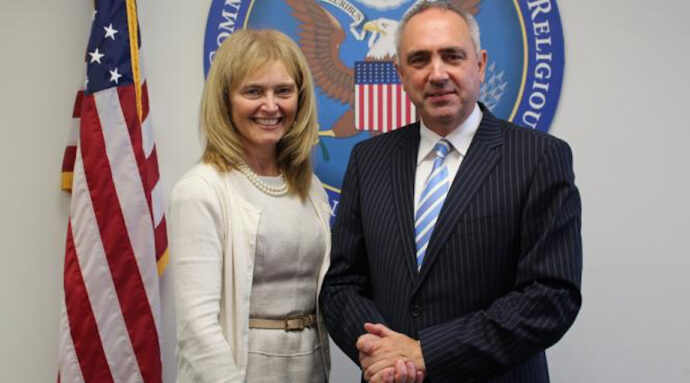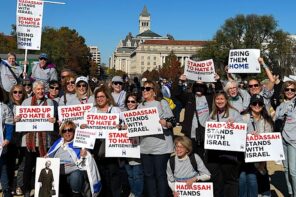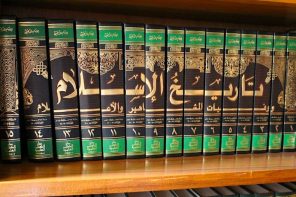This weekend in Oslo a group of parliamentarians signed a Charter for Freedom of Religion or Belief, launching an international coalition to combat religious persecution and protect religious freedom. The US Commission on International Religious Freedom (USCIRF) described the meeting as an “attempt to counter the dark networks of ISIS, al Qaeda and others focused on religious persecution and violence, with one committed to freedom of thought, religion and belief.”
USCIRF co-organized the Oslo meeting with Baroness Elizabeth Berridge, leader of the All Parties Parliamentary Group on Freedom of Religion or Belief in the British Parliament. I met Baroness Berridge last spring at the Westminster Faith Debates when we represented opposing sides on the question of whether governments should promote religious freedom abroad. Seeing her name brought to mind an odd story she recounted during our debate that involved sitting down to tea with General Sisi, shortly after the coup, to discuss the prospects for religious freedom in Egypt.
It was only a matter of time until the Baroness and others in the international religious freedom (IRF) lobby sought to capitalize on the moral panic surrounding ISIS to advance their agenda. The call to arms in Oslo is among the first attempts to link ISIS and international religious freedom, but it won’t be the last. As someone who has spent the past few years studying the global politics of the IRF lobby, my first response to the Oslo announcement was whether it would be possible to imagine a more effective ISIS-recruitment tool than the image of a group of global parliamentarians, led by the US and the UK, poised to lead the way to civilization by instructing citizens of the Middle East on how to be religiously free. In some sense, international religious freedom has become the civilizing discourse of our time.
Of course religious freedom advocacy is not the answer to the violence and oppression plaguing the contemporary Middle East. To the contrary, like missions civilisatrices of the past, such efforts tend to exacerbate the problems they are designed to resolve. Let’s be clear: ISIS and the IRF lobby cannot be equated. Yet they share more in common than either would care to admit. Both claim to be driven by the objective of universal emancipation and collective religious flourishing; both draw strength from an intensive, explicit, and highly politicized focus on religious and sectarian divisions; and both have the answer to how we should live together. In some sense they are each other’s nemesis, supporting and sustaining each other in an endlessly provocative (and for some, quite lucrative), globalized version of the American culture wars.
What would it look like to distance ourselves from the Manichean worldviews of both ISIS and the IRF lobby? Is it possible to refuse both positions, to harbor doubts about all claims to have discovered and perfected a universal model of how we ought to live together at all times and in all places in this world? Is there an alternative to the IRF lobby’s narrative in articulating a response to ISIS? Might the perception of a choice between religious freedom and religious tyranny rest in a misunderstanding of both of these supposed alternatives?
Today the IRF lobby, many IGOs and NGOs, foreign policy bureaucracies, and most of the international media relies on an understanding of religious freedom as a stable human right, legal standard and social fact that can be measured and achieved by all communities. Individuals and governments are expected to comply with this universal norm. States and societies are judged based on the extent to which they have achieved religious freedom. A small industry has emerged to quantify its presence or absence.
My experience as co-organizer of the Politics of Religious Freedom project over the past several years suggests that IRF advocacy is considerably more complex than is suggested by such accounts. To promote religious rights is to promote a particular mode of governing social diversity that implicates religion in complex and variable ways, depending on the context. Legal and political advocacy for religious freedom tends to mask other contributors to social tension and conflict, amplify and entrench the religious divisions it seeks to manage, and force political authorities to discriminate between “good” and “bad” religion. Each of these tendencies has implications for the current debate over ISIS.
A bigger field of play
Religious freedom advocacy singles out individuals and groups for legal protection as religious individuals and collectivities. Positing religion as prior to other affiliations re-politicizes and retrenches divisions between religions, and between the religious and the secular. It leads to what historian Sarah Shields describes as a particular “ecology of affiliation.” Other factors that contribute to social tension, discrimination, conflict, and co-existence are lost from sight.
In a recent piece in the New York Times magazine, the American journalist Theo Padnos described his experience as a hostage held for two years by the al-Nusra front. In reading his account I was struck by the extent to which Islam and the role of Islam in the war in Syria remain in the background, always part of the context, but never defining it. Padnos’ narrative, like those of others who have been close to the ground in this war, suggest that the tragic conditions leading to the rise of ISIS cannot be reduced to Islam, religious persecution, or a lack of religious freedom.
To understand how a movement like ISIS became possible requires grappling with the effects of a series of complex and entangled enabling conditions. As others have noted, these include a long history of state-sponsored violence with origins both inside and outside of the region, multiple legacies of colonial oppression, a pervasive lack of good governance, the widespread resonance of Islamist politics as an oppositional and anticolonial discourse, a dearth of economic opportunity for the vast majority of the region’s population, an unequal distribution of resources, sectarianizing state politics, exploitation and repression by local, regional and international elites, and ongoing oppression and dispossession of the Palestinians. ISIS is but the latest manifestation, a lashing out, and a last stand against the injustices plaguing the people who live in this part of the world.
To suggest that legal guarantees for religious freedom, as defined and imposed by the international community, will solve these complex problems and challenges is at best naïve and at worst an insult to the people of region. To endorse religious freedom as the solution is to refuse the reality and complexity of the situation on the ground. It hinders the development of informed governmental and non-governmental policy responses by deflecting attention away from the considerations described above in favor of a focus on (whatever is defined as) religion, religious leaders and religious communities.
An informed response to this crisis would combine a deep understanding of the factors listed above with a sense of humility and respect for the people of the region, from all backgrounds, that rose up beginning in 2011 to challenge impossibly repressive governments and their foreign supporters, unthinkable police brutality, and unjust living conditions. This was not, and is not, only about the politics of social and religious co-existence. It is much more encompassing. The response of the international community should reflect this complexity, honoring those who gave their lives attempting to create new forms of political community and solidarity reflecting a democratic sensibility.
Whose religion? Whose freedom?
But the problem with the IRF lobby runs deeper. Paeans to religious freedom not only mask the causes of conflict in the region but also, and more perniciously, exacerbate the situation on the ground by giving sustenance to the “us versus them,” black versus white, right versus wrong logic on which ISIS thrives. The Manichean worldview espoused by the IRF lobby—either you’re with us or against us; either you support our version of religious freedom or you don’t—ironically works to retrench the very divisions (Christian/Muslim, believer/unbeliever, western/non-western) that groups like ISIS depend on to cement and popularize a collective sense of identity and purpose defined in opposition to western states, Israel, Jews, and Christians. Prioritizing advocacy for religious freedom unwittingly reinforces the boundaries that feed ISIS’s fire. Undermining ISIS is a long-range project that involves, among other measures, unsettling the assumption that the boundaries dividing Jew from Christian from Muslim from Hindu from unbeliever are the only ones that matter. They aren’t.
And yet the IRF project presses the public imagination, legal and political institutions and social practice in the opposite direction, reinforcing the public and political salience of sectarian divisions and empowering some leaders and orthodoxies over others. In this worldview, individuals are identified based on perceived religious affiliation—for instance, he’s a Muslim, she’s a Christian, they are part of a particular “religious group.” These groups are publically consecrated as discrete faith communities and official spokespersons are called forth to represent them. A “religionized” political landscape takes shape. Faith leaders who enjoy good relations with the political authorities are emboldened, while others are marginalized. Dissenters, doubters, those who practice multiple traditions, and those on the margins of community fade into the background.
As I’ve discussed elsewhere, in the world of IRF many violations of human dignity fail to register at all, languishing beneath the threshold of national and international recognition as scarce resources go to rescuing persecuted religionists and defending faith communities that have broken through the threshold of international religio-political recognition. As I argue in Beyond Religious Freedom, these selection dynamics cannot be mitigated with a more diverse and sophisticated understanding of religion or religious community. There is no easy fix. Certain questions always plague such efforts: Which religions are protected? Which leaders are engaged? And whom exactly are these leaders presumed to represent?
In another tragic mirroring of ISIS’s ceaseless reckoning of who is a “good” or “bad” Muslim, the politics of religious freedom force political authorities to make determinations between “good” and “bad” religion. In ISIS’s books, al-Nusra once occupied the position of good Muslim, was reclassified as bad Muslim, and, as of this writing, appears to be back in the “good” Muslim column as the two fronts join forces against Assad and the US-led airstrikes. A related set of dynamics bedevils American efforts to identify and support “religious moderates” in Syria. Prioritizing religious freedom in the fight against ISIS simply exaggerates these dynamics as the IRF lobby struggles desperately to distinguish between sects and leaders who support “religious freedom” (as defined by the lobby and its powerful donors) and those who do not.
Beyond religious freedom
It’s not my intention to judge individuals who find themselves in difficult circumstances and choose to make political claims in the language of religious freedom. Nor do I wish to undermine local groups working to oppose violence and discrimination that have chosen to register complaints using the legal tools at their disposal, some of which will inevitably invoke religious classifications. This is understandable. But there is a larger story to be told about that which is hastily described by the IRF lobby, the media, and others today as “religious” violence and persecution—and freedom and toleration.
The challenges facing the Middle East today cannot be reduced to a choice between religious freedom and religious violence. The solution to today’s dilemmas of global collective life lie neither in the relentless pursuit of the international religious freedom agenda nor in ISIS’s oppositional fantasy world. Despite the rhetoric in Oslo, and the momentum of the new religion agenda in Brussels, Washington, and Ottawa, the last thing the people of the Middle East need is a religious freedom charter that will serve only to embolden ISIS among its followers. If a solution exists, it lies beyond religious freedom, and with the people of the region.





